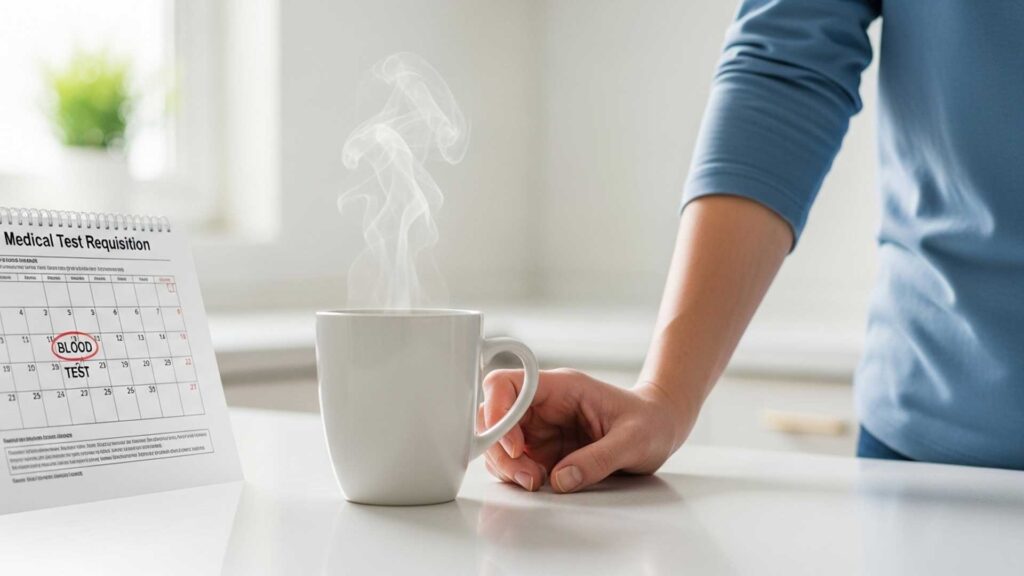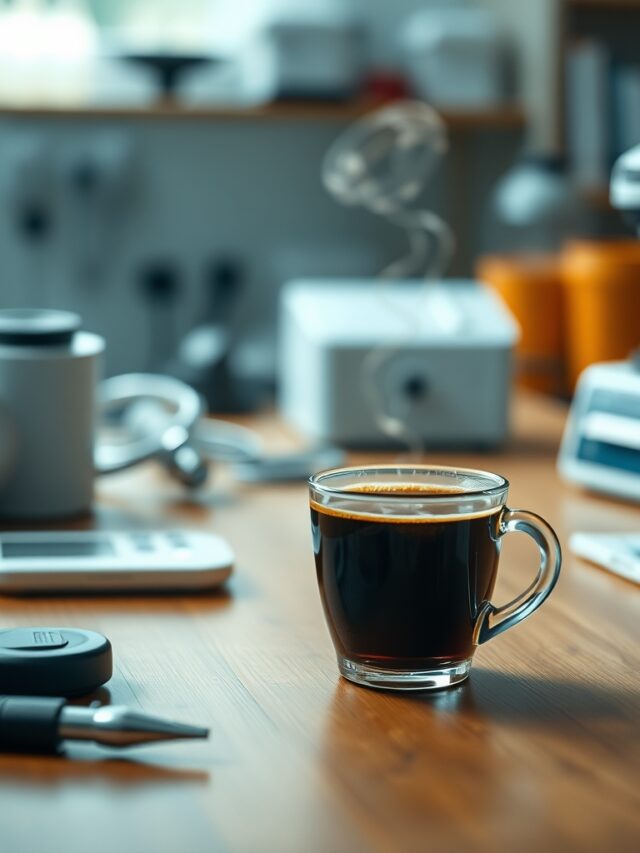It’s a familiar morning ritual for millions across India. You wake up, and before you can truly start your day, you reach for that comforting, aromatic cup of coffee. But on the morning of a scheduled blood test, a moment of hesitation strikes. You know the rules for a fasting test are strict—no food or drink. But this one is a non-fasting test. Surely, a small cup of coffee won’t hurt, right?

This seemingly simple question has a surprisingly complex answer. While it’s not a straightforward “yes” or “no,” understanding the science behind how your favourite brew interacts with your body can make the difference between an accurate health reading and a potentially skewed one. This guide provides a deep, evidence-based answer, helping you navigate your blood test preparation in India with clarity and confidence.
Understanding the Basics: Fasting vs. Non-Fasting Blood Tests
Before we tackle the coffee question, it’s essential to understand the landscape of blood tests. Your doctor or the diagnostic lab will always specify whether your test requires fasting.
A fasting blood test means you cannot eat or drink anything, except for plain water, for a specific period, usually 8 to 12 hours. This is crucial for tests where recent food intake would directly alter the results. Common examples include:
- Fasting Blood Sugar (FBS) for diabetes monitoring.
- Lipid Profile to check cholesterol and triglyceride levels.
A non-fasting blood test, on the other hand, does not require you to abstain from food for a prolonged period. This is because the biomarkers being measured are not significantly affected by a recent meal. Many common tests prescribed in India fall into this category, such as:
- Complete Blood Count (CBC)
- Kidney Function Tests (KFT)
- Most hormone tests
- Blood typing and cross-matching
- Tests for many infections
It’s important to understand that “non-fasting” doesn’t mean “no rules.” The goal is always to get the most accurate snapshot of your health, and what you consume—even just a beverage—can still have an impact. The non-fasting blood test rules are about avoiding specific substances that can interfere with specific tests.
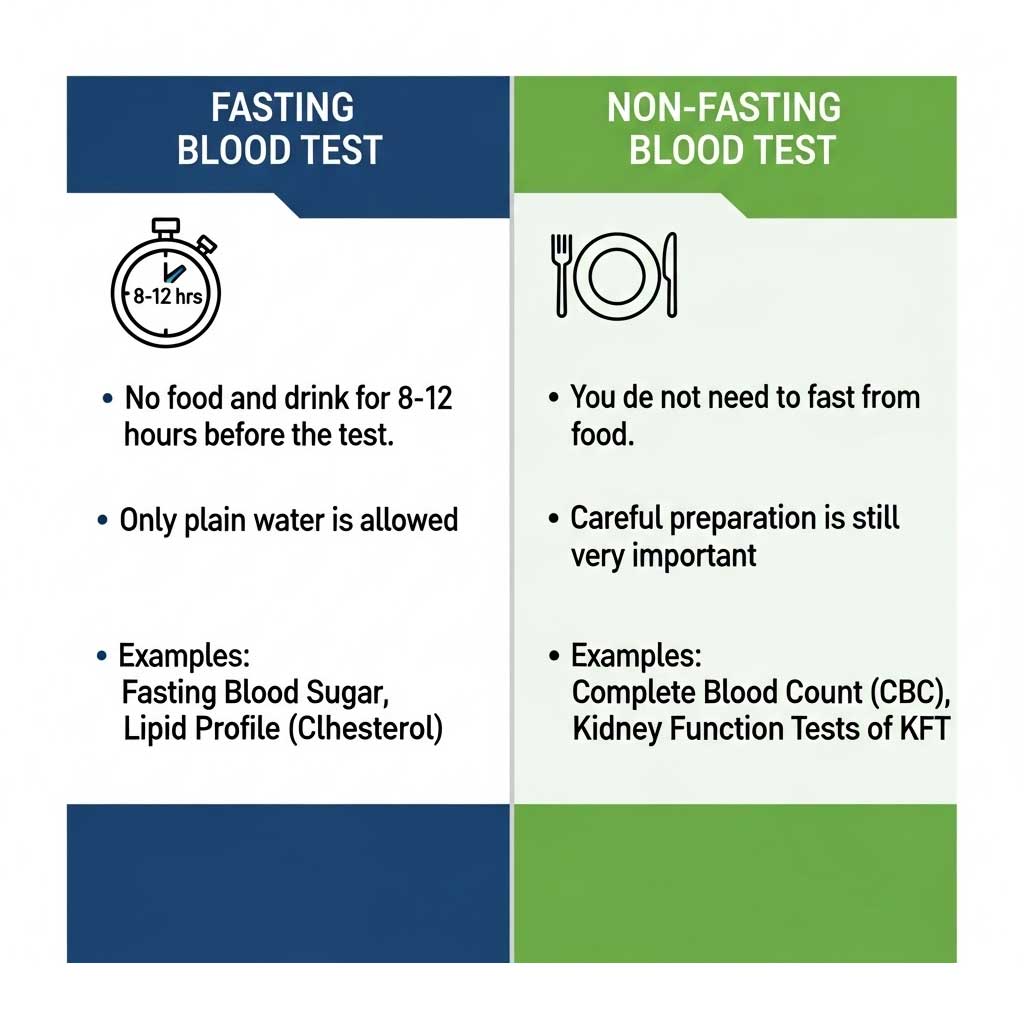
The Big Question: Black Coffee vs. Your Regular Brew
Here is the most critical distinction we need to make right away. When we discuss the possibility of having coffee, we are talking only about plain, black coffee.
Why Black Coffee is the Only Consideration
Plain black coffee is simply coffee beans brewed with hot water. It contains virtually no calories, fats, proteins, or sugars. The primary active ingredient that can interfere with a blood test is caffeine. Therefore, the debate revolves around the physiological effects of caffeine.
The Problem with Additives: Sugar, Milk, and Creamers
If your daily coffee includes any of the following, the answer to “Can I drink coffee before a blood test?” is a resounding and definitive NO. Here’s why:
- Sugar, Jaggery, or Honey: Adding any form of sugar will cause an immediate spike in your blood glucose levels. This will make any test measuring your blood sugar completely inaccurate and could lead to a misdiagnosis or unnecessary further testing.
- Milk, Cream, or Milk Powder: Adding dairy or non-dairy creamers introduces fats (lipids), proteins, sugars (lactose), and minerals like calcium into your bloodstream. These can directly interfere with a wide range of tests, including kidney function panels, lipid profiles, and electrolyte readings. In essence, adding milk or sugar to your coffee is the same as eating a small meal, which invalidates the controlled conditions needed even for a non-fasting test.
So, for the rest of this article, when we mention “coffee,” we are exclusively referring to black coffee before blood test India. If your coffee isn’t black, you must skip it.

The Science of a Sip: How Caffeine Interacts with Your Body and Blood Work
Even if you stick to plain black coffee, caffeine itself is a powerful substance that triggers several physiological responses. Understanding these effects is key to knowing why it might interfere with your results. These are the effects of coffee on blood work.
The Diuretic Effect and Dehydration
Caffeine is a well-known diuretic, which means it makes you urinate more frequently. While one cup might not have a drastic effect, consuming your usual 2-3 cups can lead to a noticeable loss of body fluid.
How It Affects Your Test
This fluid loss can lead to a state of mild dehydration. When you are dehydrated, the fluid component of your blood (plasma) decreases, making your blood more concentrated. This phenomenon, known as hemoconcentration, can falsely elevate the results of certain tests. For instance, in a coffee before CBC test scenario, your red blood cell count, hemoglobin, and hematocrit could appear slightly higher than they actually are.
Practical Implications
Beyond skewed results, dehydration makes your veins less prominent and harder to find. This can make the blood draw process more difficult for the phlebotomist, potentially requiring multiple attempts.
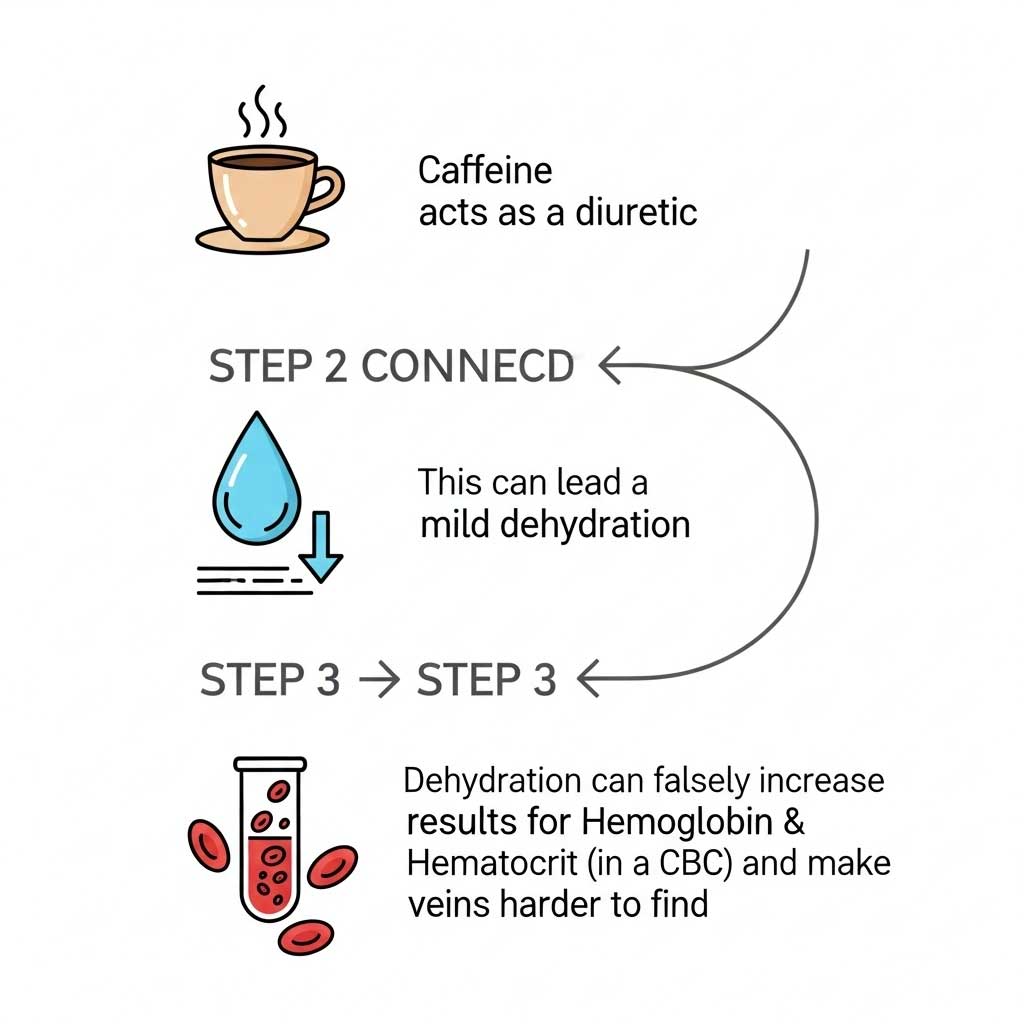
The Stimulant Effect: Heart Rate and Blood Pressure
Caffeine is a central nervous system stimulant. It blocks adenosine, a neurotransmitter that makes you feel drowsy, while triggering the release of adrenaline. This is what gives you that feeling of alertness and energy.
How It Affects Your Test
This stimulation has a direct impact on your cardiovascular system. Research shows that caffeine can temporarily increase systolic blood pressure by 3 to 15 mm Hg and diastolic blood pressure by 4 to 13 mm Hg. Your heart rate can also increase.
Practical Implications
If you are having a blood test as part of a routine check-up for hypertension or any cardiac evaluation, these temporary spikes can give your doctor a misleading picture of your baseline cardiovascular health. It’s crucial for your vitals to be in a resting state for an accurate assessment.
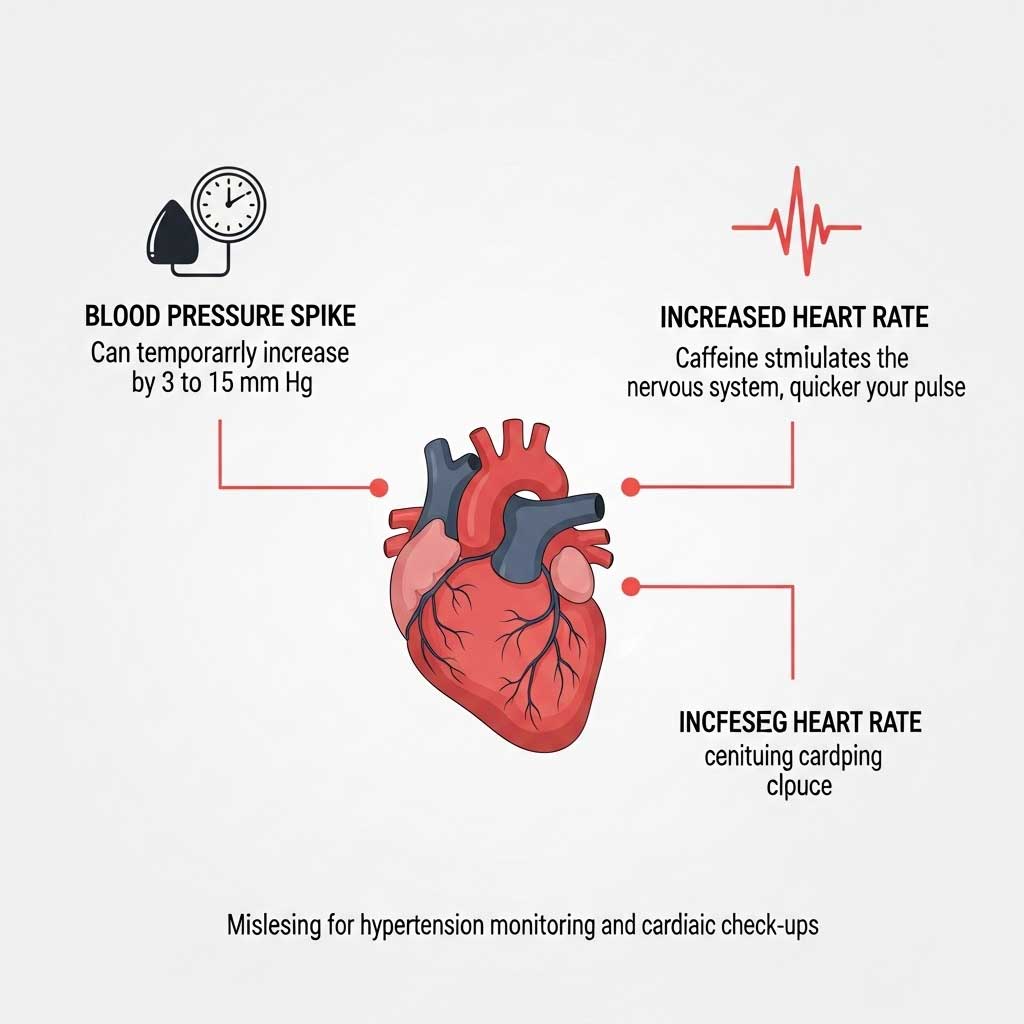
The Hormone Connection: Cortisol and Adrenal Glands
Your morning coffee gives you a “jolt” for a reason. It stimulates your adrenal glands to produce cortisol, often called the “stress hormone.” Cortisol is naturally highest in the morning and gradually decreases throughout the day.
How It Affects Your Test
Drinking coffee artificially inflates your cortisol levels. If your doctor has ordered a blood test to check your cortisol levels (a test used to diagnose conditions like Cushing’s syndrome or Addison’s disease), drinking coffee beforehand will render the results completely inaccurate, showing a falsely elevated level.
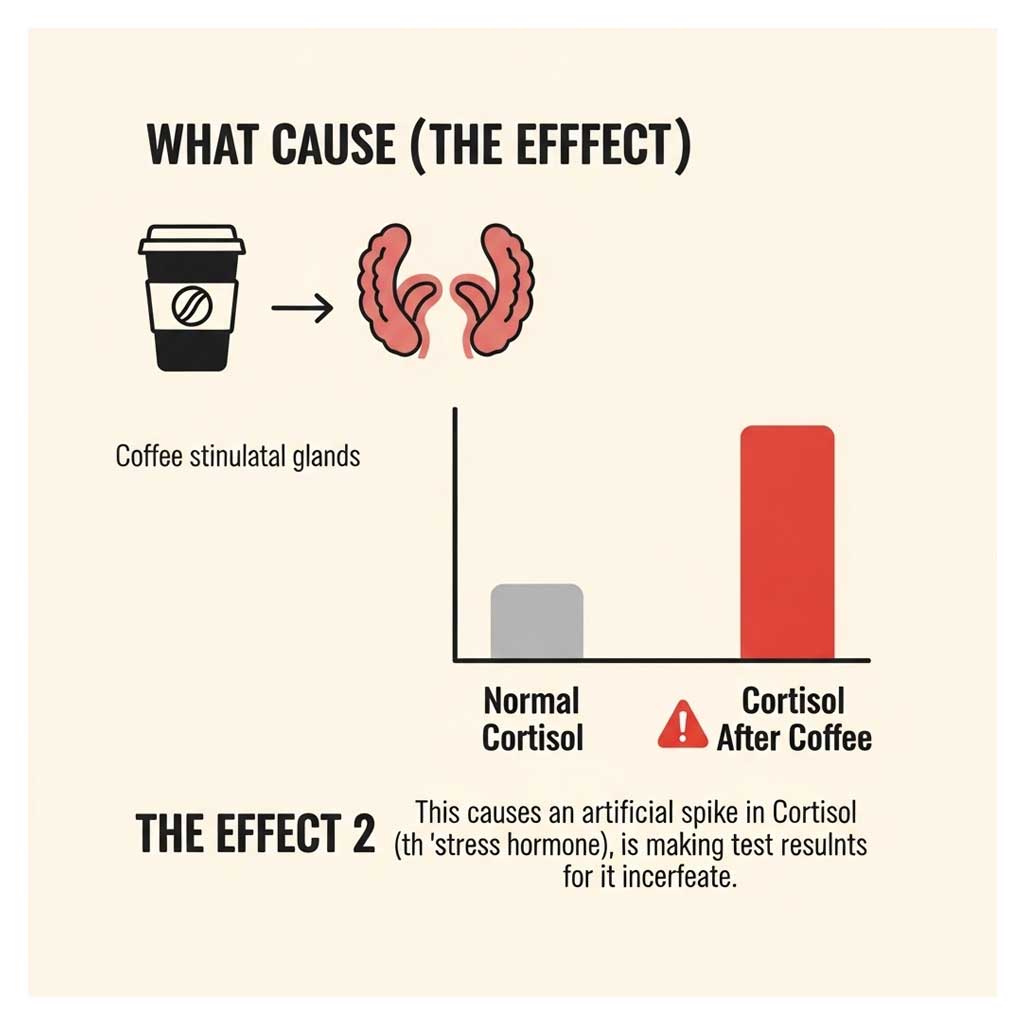
The Nutrient Block: Impact on Mineral Absorption
Coffee contains compounds called tannins and polyphenols. While these have antioxidant benefits, they can also interfere with your body’s ability to absorb certain nutrients, most notably iron.
How It Affects Your Test
The tannins in coffee can bind to non-heme iron (the type of iron found in plant-based foods) and reduce its absorption by up to 80% if consumed around the same time as a meal.
Practical Implications
If you are taking an iron absorption test or having your iron levels (ferritin) checked for anemia, drinking coffee can interfere with the results. It’s a critical factor to consider, as iron deficiency is a significant health concern in India.
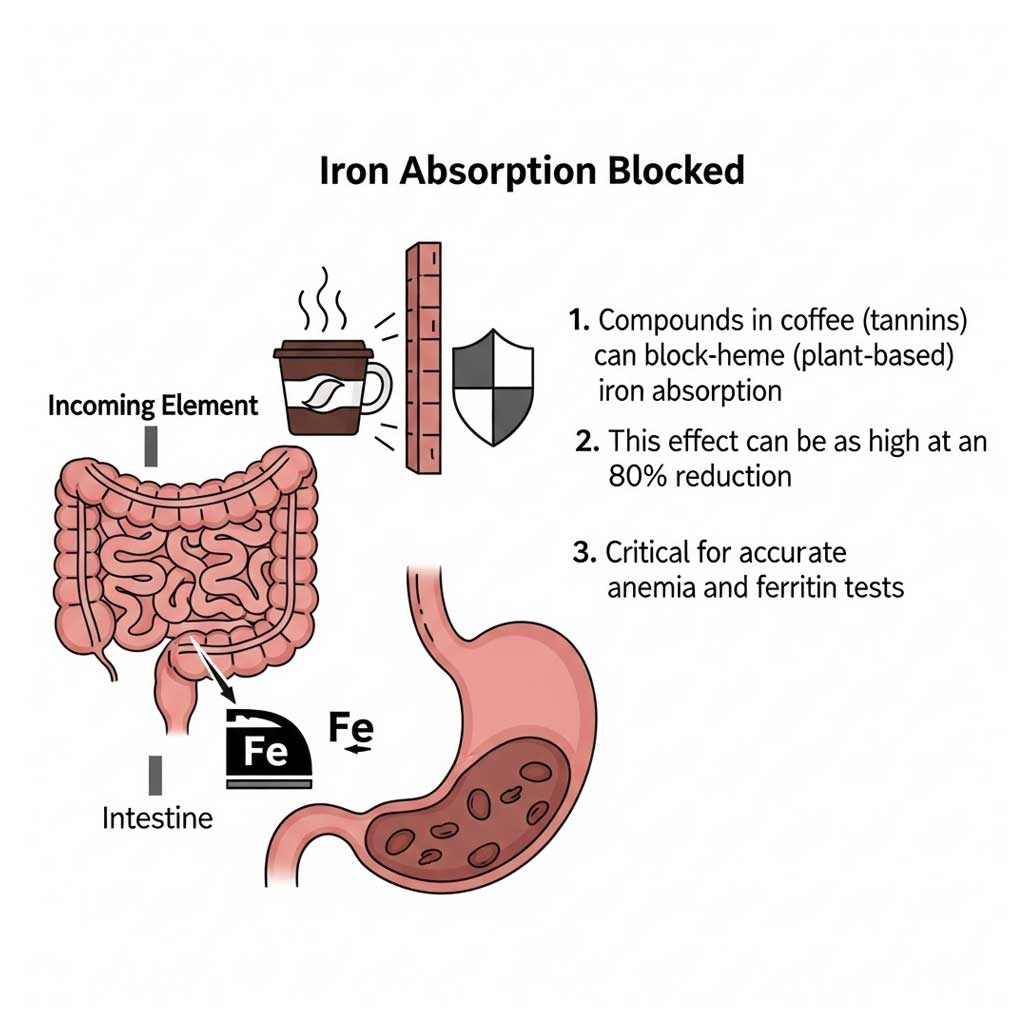
The Kidney Question: Impact on KFTs
The discussion around coffee before kidney function test is important. Your kidneys are responsible for filtering your blood. Caffeine can temporarily increase blood flow and the filtration rate of your kidneys.
How It Affects Your Test
This temporary change can potentially alter the levels of substances measured in a Kidney Function Test (KFT), such as creatinine and the estimated Glomerular Filtration Rate (eGFR). While the effect may be subtle from a single cup, it introduces a variable that can cloud the accuracy of the results, which need to be as stable as possible. The caffeine and blood test results for kidney health are best kept separate.
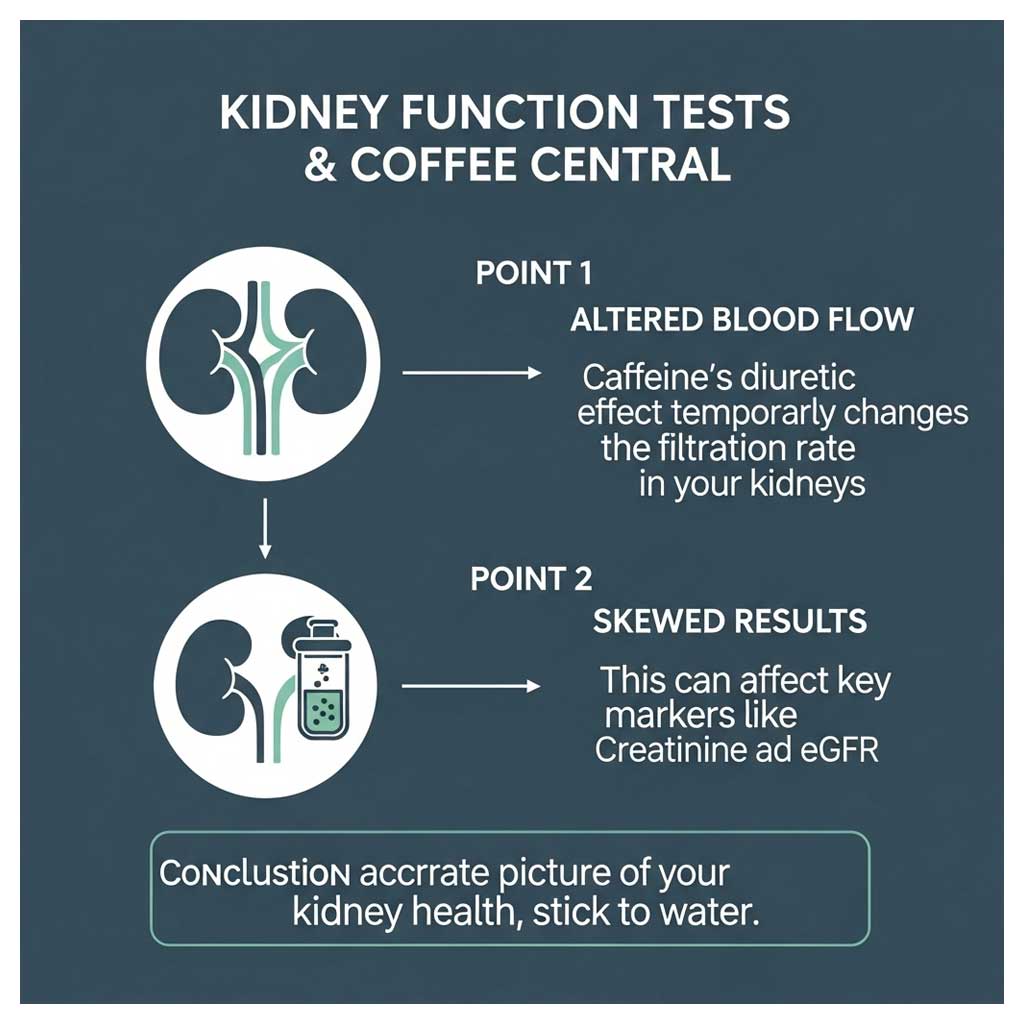
The Verdict: Which Non-Fasting Tests Are Most Affected?
So, having understood the science, let’s get to the practical verdict. While the safest answer is always to avoid coffee, here is a more nuanced look at which tests are more likely to be impacted.
Tests Generally Unaffected (with extreme caution)
- Blood Typing: Your blood group (A, B, AB, O) is determined by antigens on your red blood cells and is not affected by coffee.
- Complete Blood Count (CBC): While severe dehydration can affect a CBC, a single cup of black coffee followed by a glass of water is unlikely to cause significant changes for most healthy individuals. However, the risk of dehydration-induced changes remains.
Tests That Can Be Significantly Affected
- Kidney Function Tests (KFT): Not recommended due to the potential impact on filtration rates and hydration.
- Iron Profile / Ferritin Test: A definite no. The interference with iron absorption can lead to inaccurate results.
- Cortisol Level Tests: A definite no. Coffee will falsely elevate your cortisol levels.
- Any test accompanied by blood pressure measurement: Not recommended, as caffeine can temporarily raise your blood pressure.
- Electrolyte Panel: Not recommended, as the diuretic effect can cause minor fluctuations in sodium and potassium levels.
To make this clearer, here is a detailed table breaking down the impact of black coffee on various non-fasting tests.
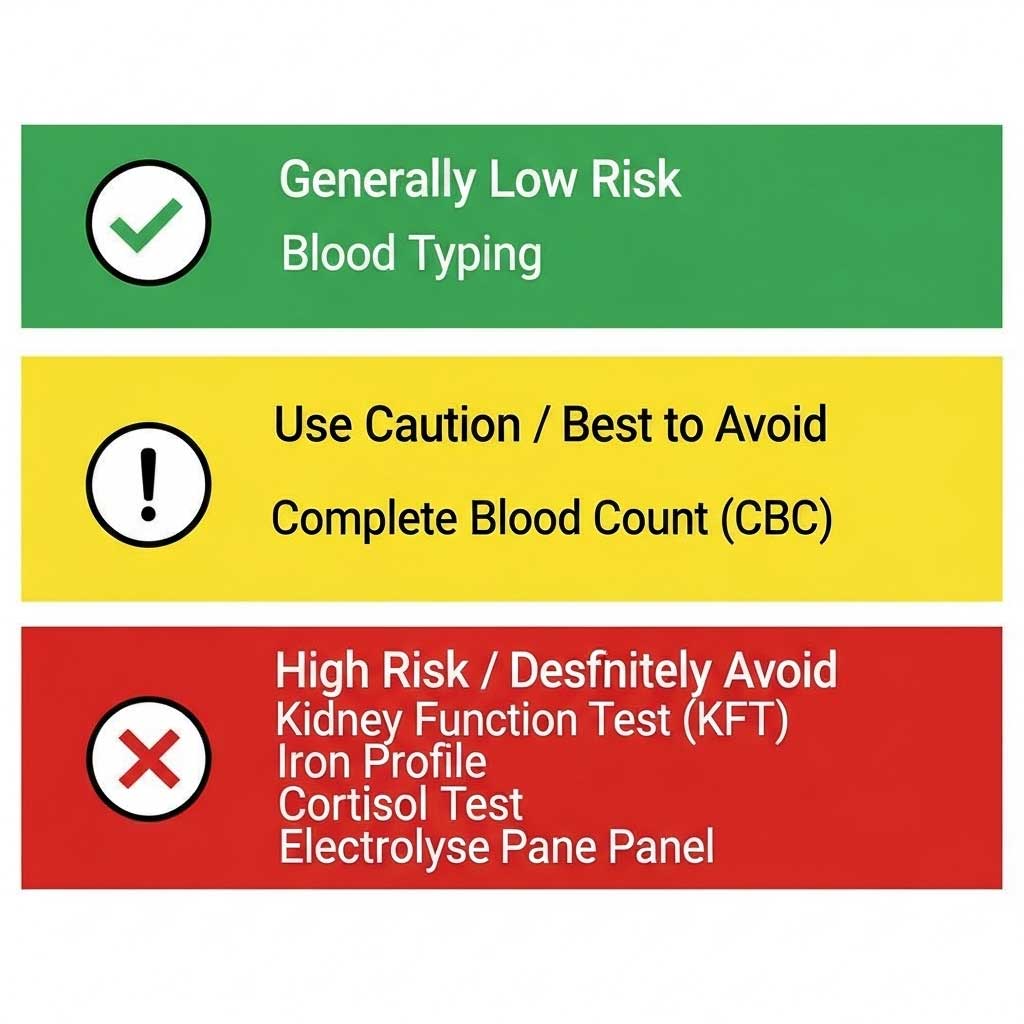
| Type of Non-Fasting Blood Test | Can I Drink BLACK Coffee? | Scientific Reason and Potential Impact |
| Complete Blood Count (CBC) | Maybe, with Caution | Diuretic effect can cause dehydration, potentially leading to hemoconcentration and slightly elevated Red Blood Cell, Hemoglobin, and Hematocrit counts. |
| Kidney Function Test (KFT) | Not Recommended | Caffeine’s diuretic effect can temporarily alter blood flow to the kidneys, potentially affecting Creatinine and eGFR (estimated Glomerular Filtration Rate) readings. |
| Iron Profile / Ferritin Test | No | The tannins in coffee significantly inhibit the absorption of non-heme (plant-based) iron. This can lead to a falsely low reading of your iron status. |
| Hormone Test (e.g., Cortisol) | Definite No | Coffee stimulates the adrenal glands, causing a temporary but significant spike in cortisol levels, which will lead to an inaccurate test result. |
| Blood Typing (Blood Group Test) | Generally Yes | Coffee does not interfere with the antigens on red blood cells that determine your blood type. |
| Electrolyte Panel | Not Recommended | The diuretic effect can cause fluctuations in electrolyte levels like sodium and potassium due to increased urination. |
| Cardiac Enzyme Tests | Consult Your Doctor | While it doesn’t directly affect the enzymes, caffeine’s stimulant effect on heart rate and blood pressure is undesirable when assessing cardiac health. |
| Vitamin & Mineral Tests | Depends on the Vitamin | Caffeine can interfere with the absorption and metabolism of certain nutrients like B vitamins and calcium. It’s best to avoid it. |
Guidelines from Indian Diagnostic Labs
When you look at the official patient preparation guidelines from major diagnostic chains in India, you’ll notice a consistent theme. Leading labs like Dr Lal PathLabs and Metropolis Healthcare place a strong emphasis on hydration with water. Their online Dr Lal PathLabs blood test instructions and Metropolis blood test preparation guides explicitly tell patients to drink plenty of water before a blood draw.
Crucially, they do not mention coffee or tea as acceptable alternatives. This omission is intentional. For a diagnostic lab, the priority is to eliminate every possible variable that could interfere with results. By recommending only water, they ensure a stable baseline for every patient, leading to the most accurate and reliable data.
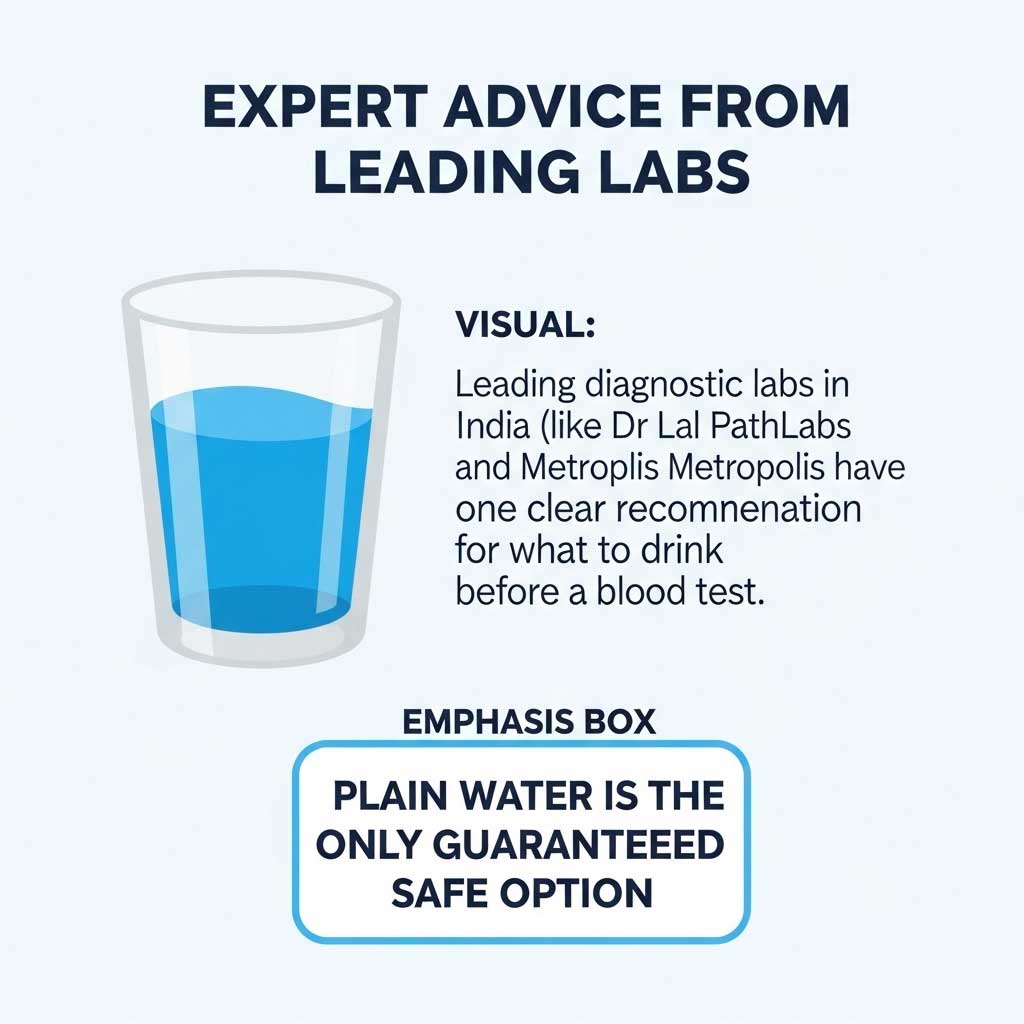
The Golden Rule: When in Doubt, Drink Water
After reviewing all the evidence, the conclusion is clear. The single best beverage to drink before any blood test—fasting or non-fasting—is plain water.
Here’s why water is the perfect choice:
- It Promotes Hydration: Being well-hydrated makes your veins fuller and easier to access for the phlebotomist, leading to a quicker, smoother blood draw.
- It Has No Interfering Substances: Water contains no caffeine, calories, sugars, fats, or minerals that can skew your test results.
- It Helps Flush Your System: Water helps your kidneys function optimally to clear waste products from your body.
Ultimately, a blood test is a small snapshot in time that provides vital information about your long-term health. Sacrificing your morning coffee for one day is a small price to pay to ensure that information is as accurate as humanly possible. This is the most important thing to know about what to drink before blood test.

Frequently Asked Questions (FAQs)
1. So, I can never drink coffee before any non-fasting test?
While for some tests like blood typing the direct impact is negligible, the general and safest medical advice is to avoid it. The potential for dehydration and other systemic effects makes it a variable worth eliminating to ensure the highest accuracy for all your results.
2. What about decaffeinated coffee? Is that okay?
Decaf coffee still contains small amounts of caffeine and the same tannins that can interfere with iron absorption. Furthermore, the roasting process can introduce other compounds. It is safer to avoid it and stick to water.
3. I accidentally drank coffee with sugar. Should I cancel my non-fasting blood test?

Yes, you should. You must call the lab or your doctor’s clinic to inform them and reschedule your test. Drinking coffee with sugar or milk will almost certainly affect your results, and it’s better to get an accurate reading at a later date.
4. How long does the effect of one cup of coffee last on blood work?
Caffeine’s effects typically peak 30-60 minutes after consumption and its half-life (the time it takes for your body to eliminate half of it) is about 3 to 5 hours. To be completely safe, you should avoid coffee for at least 8 hours before your test.
5. Does tea have the same effect as coffee before a blood test?
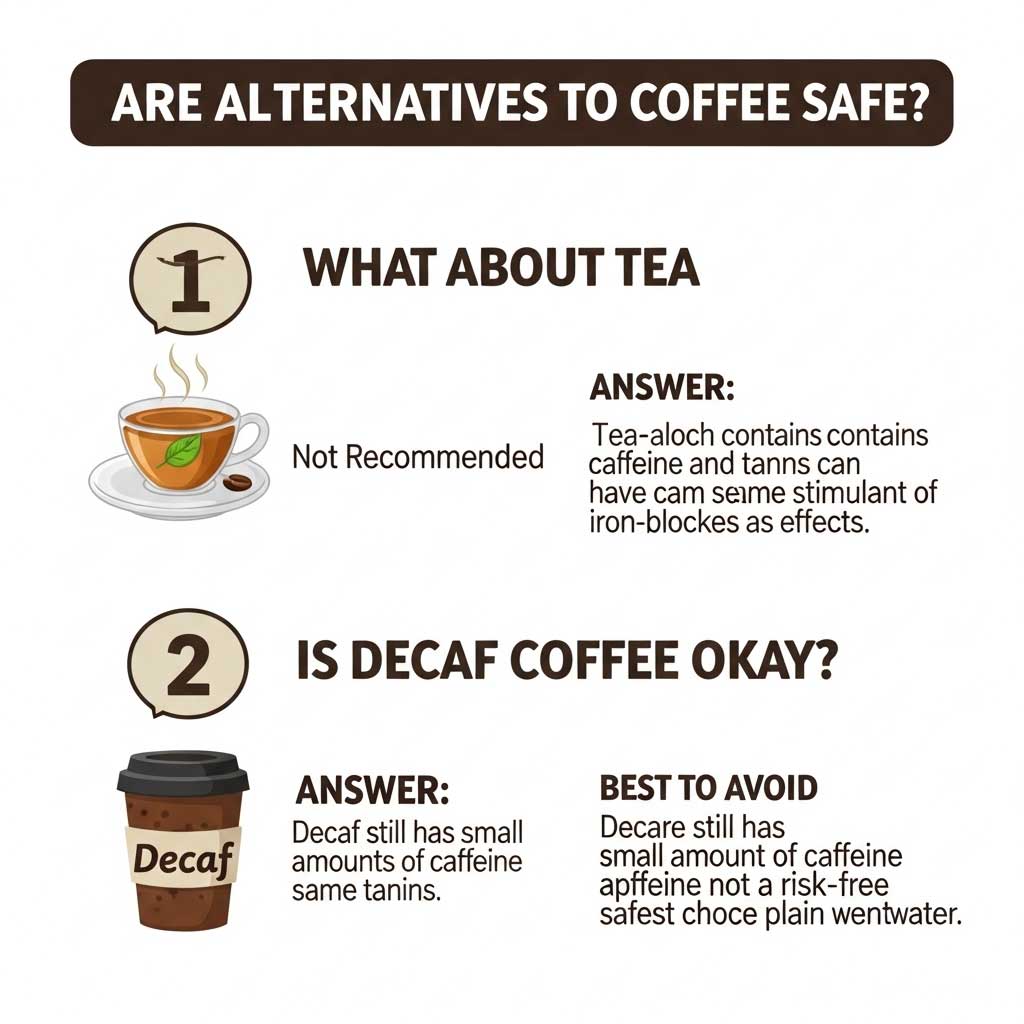
Yes. Tea (especially black tea) contains both caffeine and tannins, similar to coffee. Therefore, it can have similar diuretic, stimulant, and iron-blocking effects. It is also best to avoid tea before a blood test.
6. I need my morning coffee to avoid a caffeine-withdrawal headache. What should I do?
This is a common concern. Try to schedule your blood test for as early in the morning as possible. This way, you can have your coffee right after the blood draw is complete, minimizing the time you have to go without it. Drink plenty of water, as dehydration can make withdrawal headaches worse.
7. Will drinking coffee make the blood draw itself more painful?
Not directly. However, if the diuretic effect of coffee leads to dehydration, your veins can become harder to locate. This might make the process more difficult for the phlebotomist and could potentially lead to more discomfort.
8. Do these rules apply to urine tests as well?
Yes, they often do. Caffeine’s diuretic effect can dilute your urine, which can affect the concentration of substances being measured in a urinalysis. Always follow the specific preparation instructions given for any lab test.
9. The lab technician didn’t tell me not to drink coffee. Does that mean it’s fine?
Not necessarily. Lab technicians provide basic instructions, but they may assume you know the general rules. The responsibility for ensuring a clean sample lies with the patient. Always err on the side of caution.
10. Besides coffee, what else should I avoid before a non-fasting blood test?
You should also avoid alcohol for at least 24 hours, as it can affect liver function results and cause dehydration. Avoid vigorous exercise right before the test, as it can temporarily increase certain enzyme and inflammatory markers. Finally, always inform the phlebotomist of any medications or supplements you are taking.

